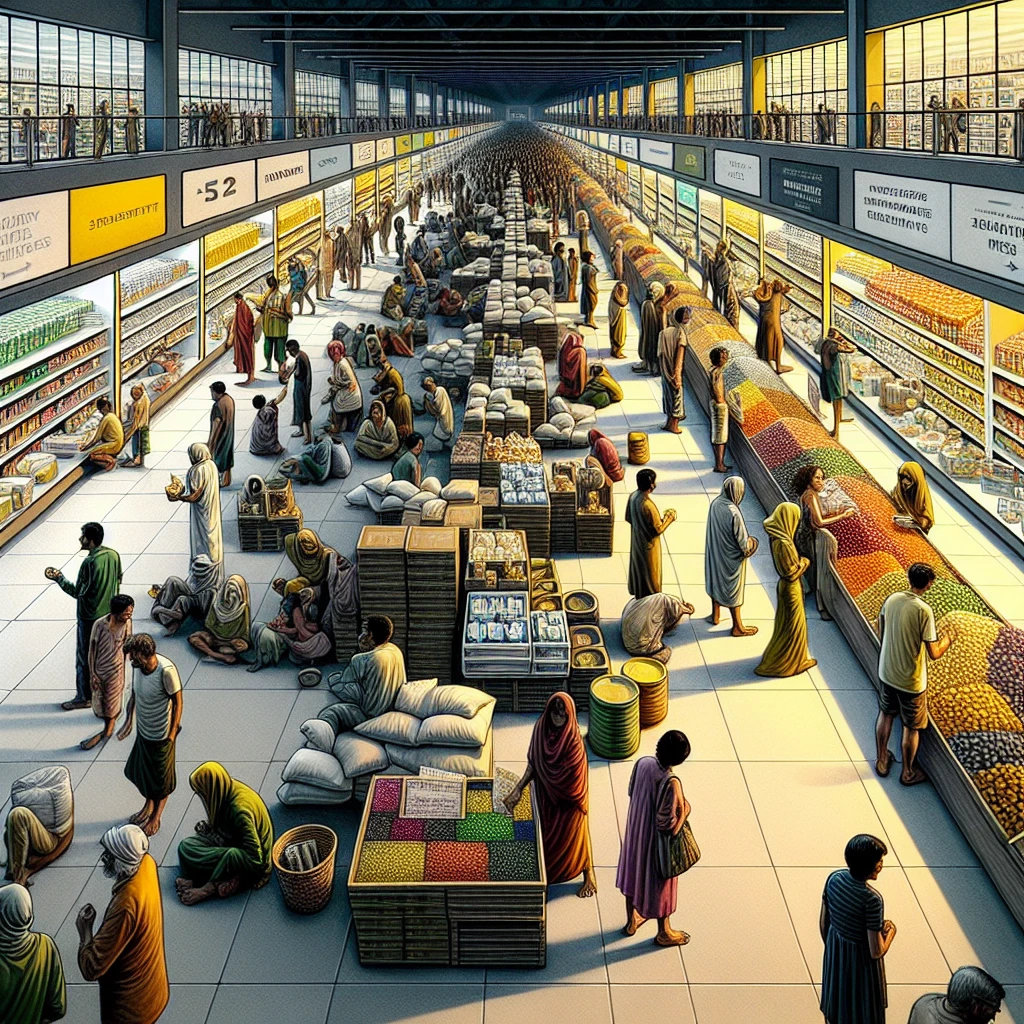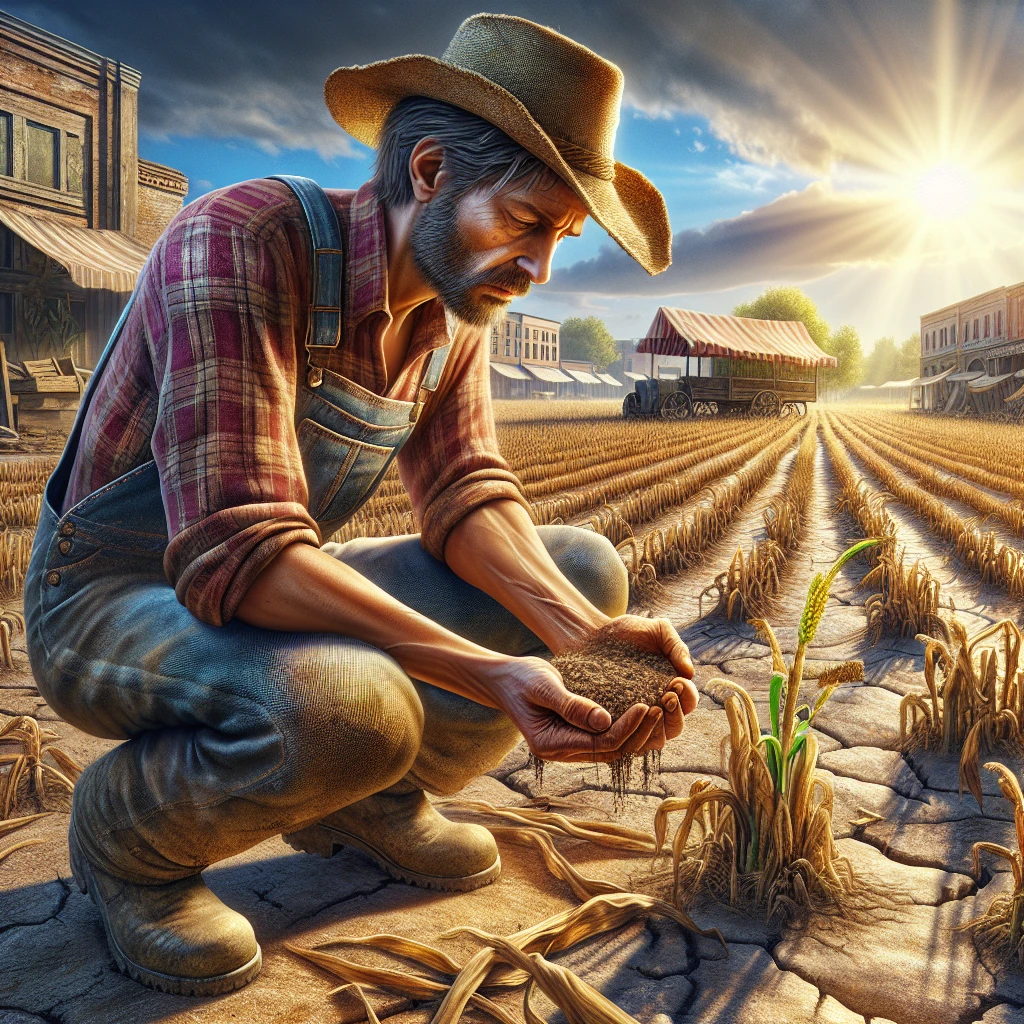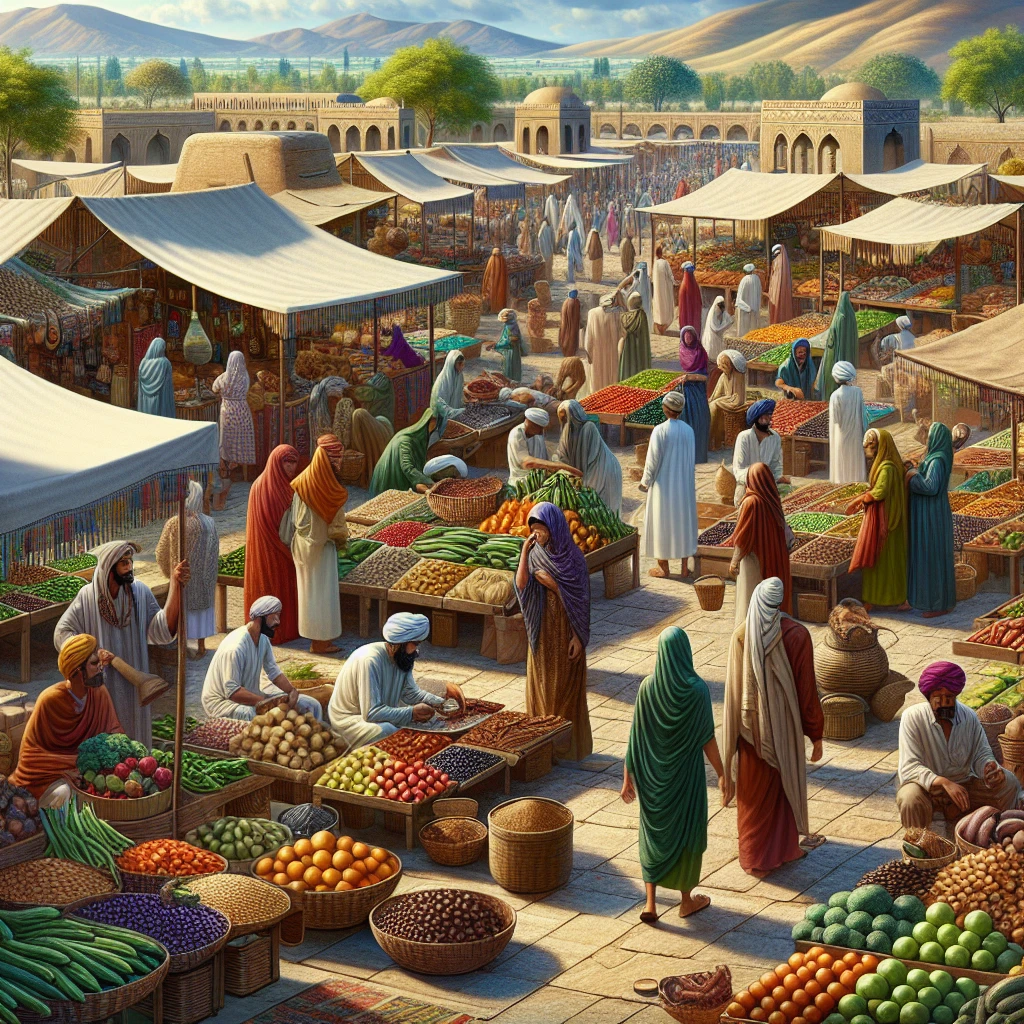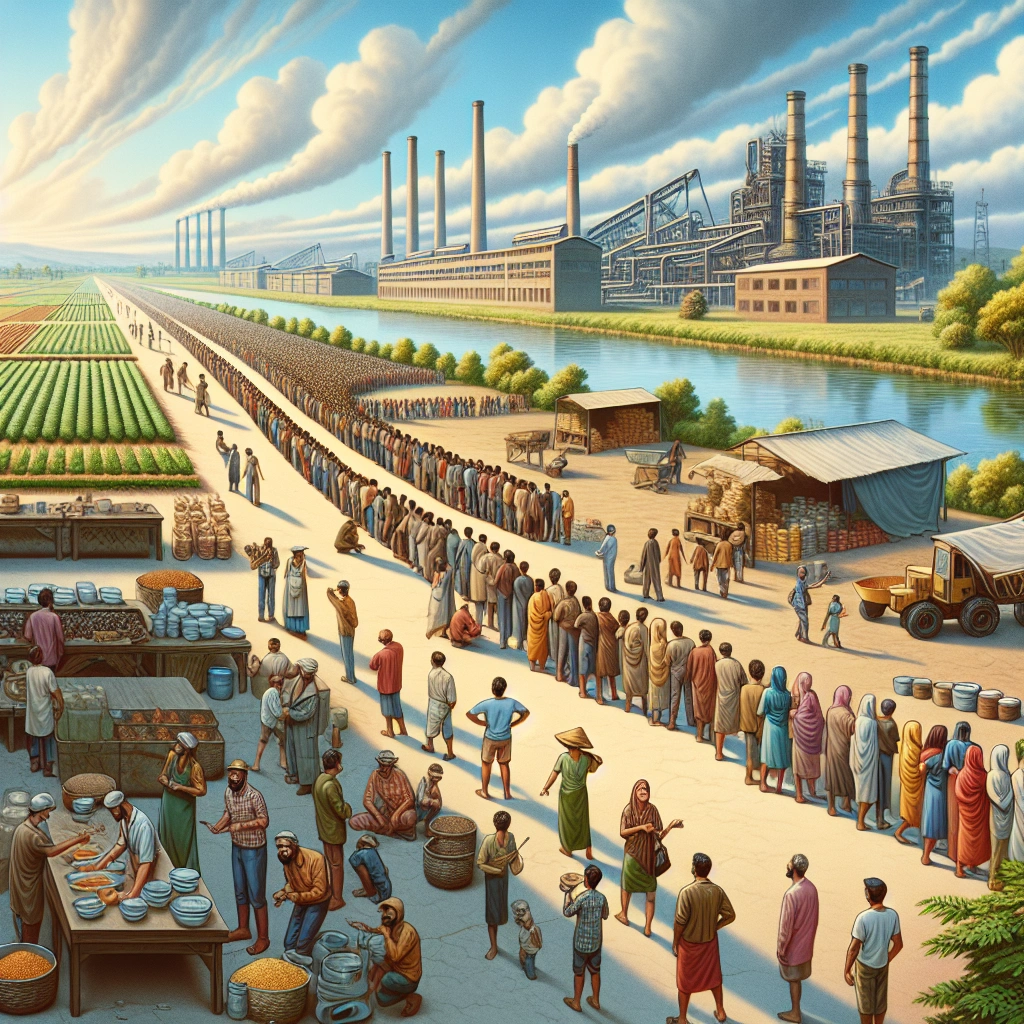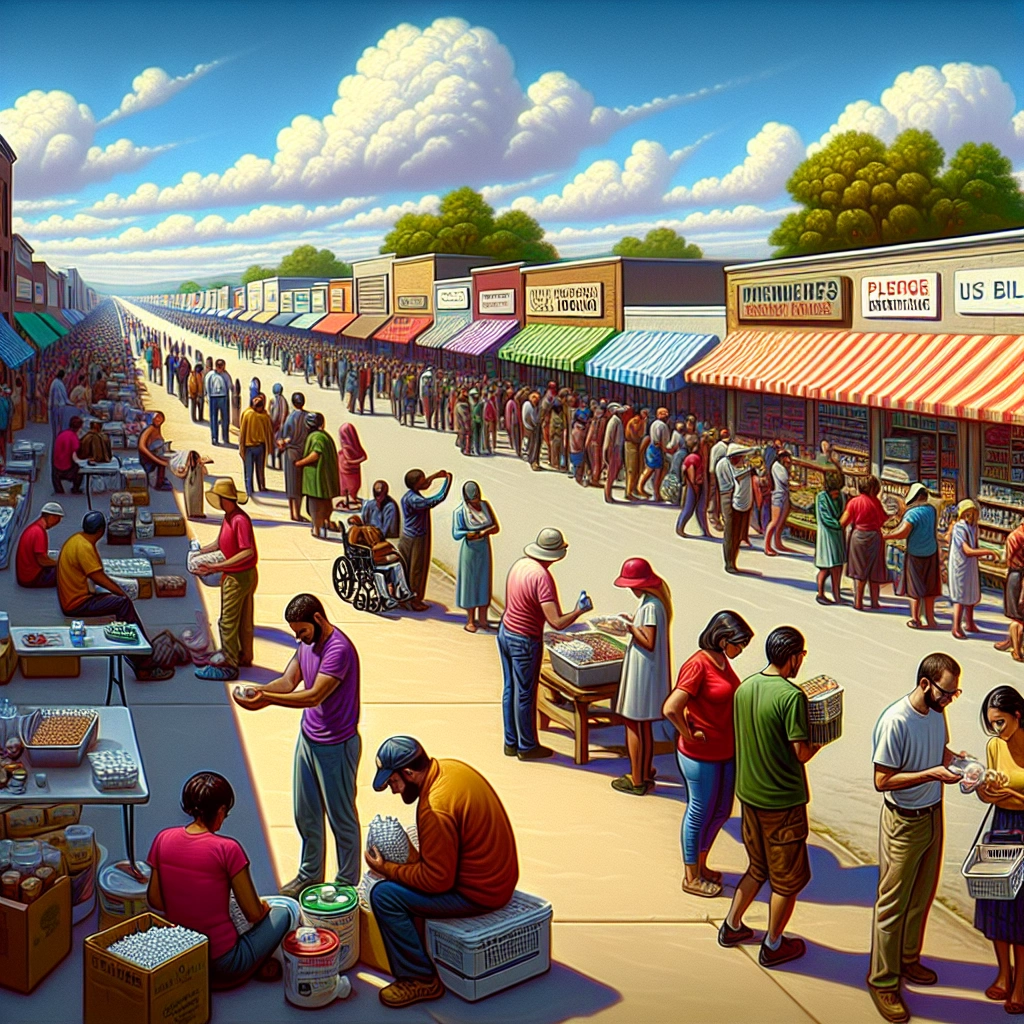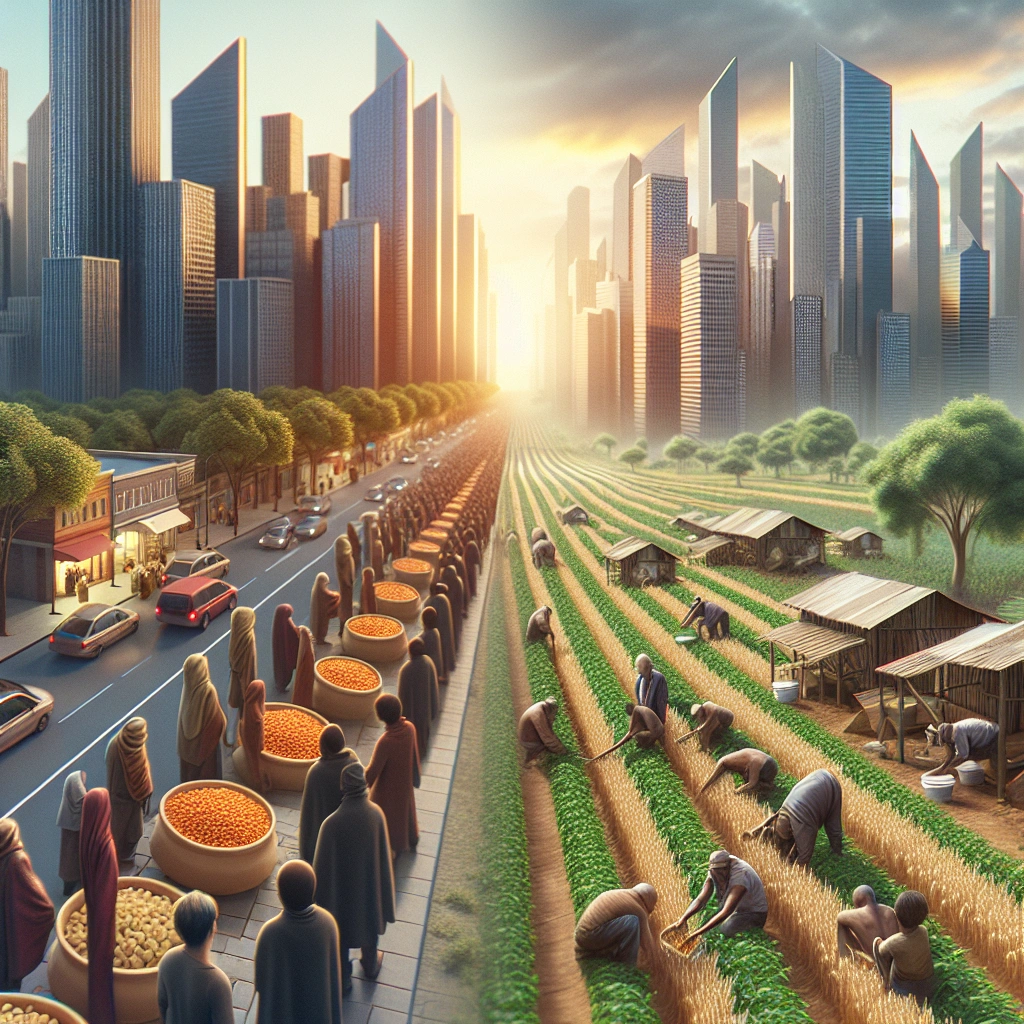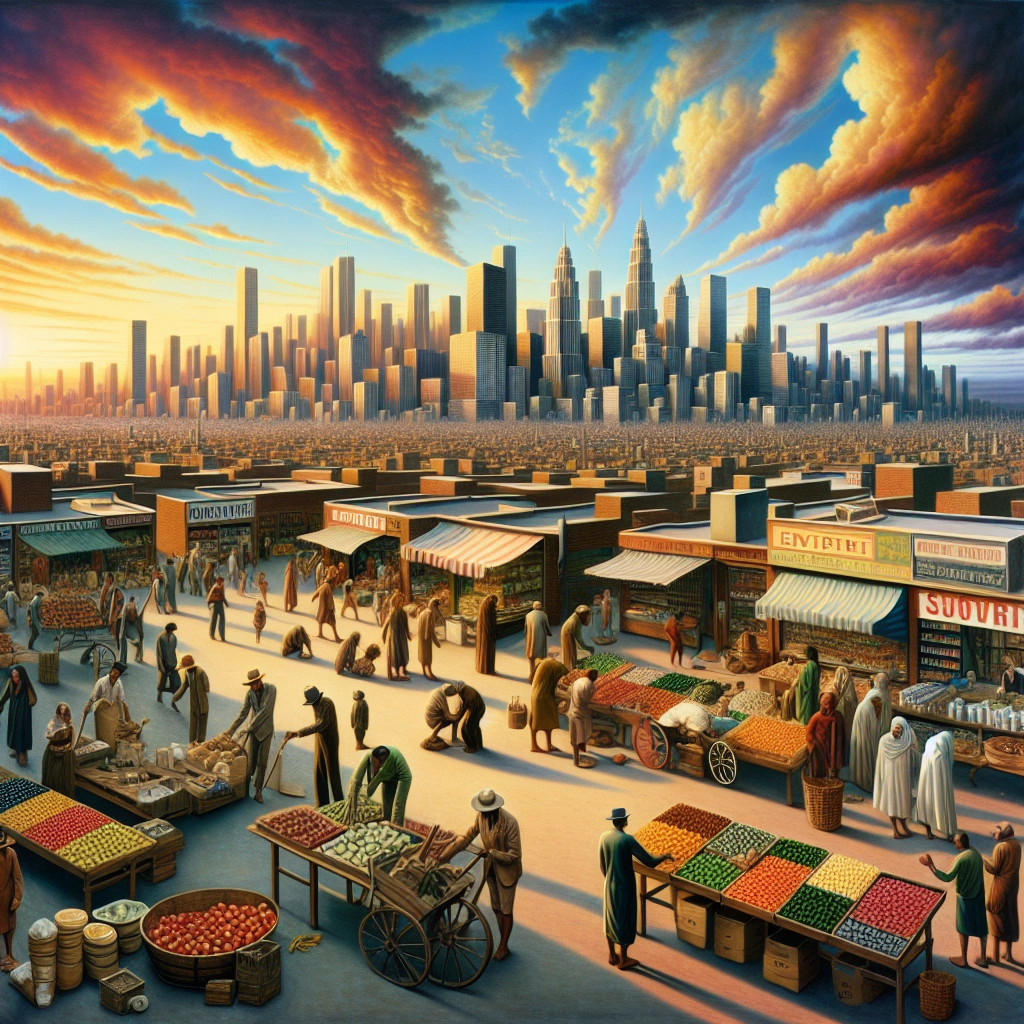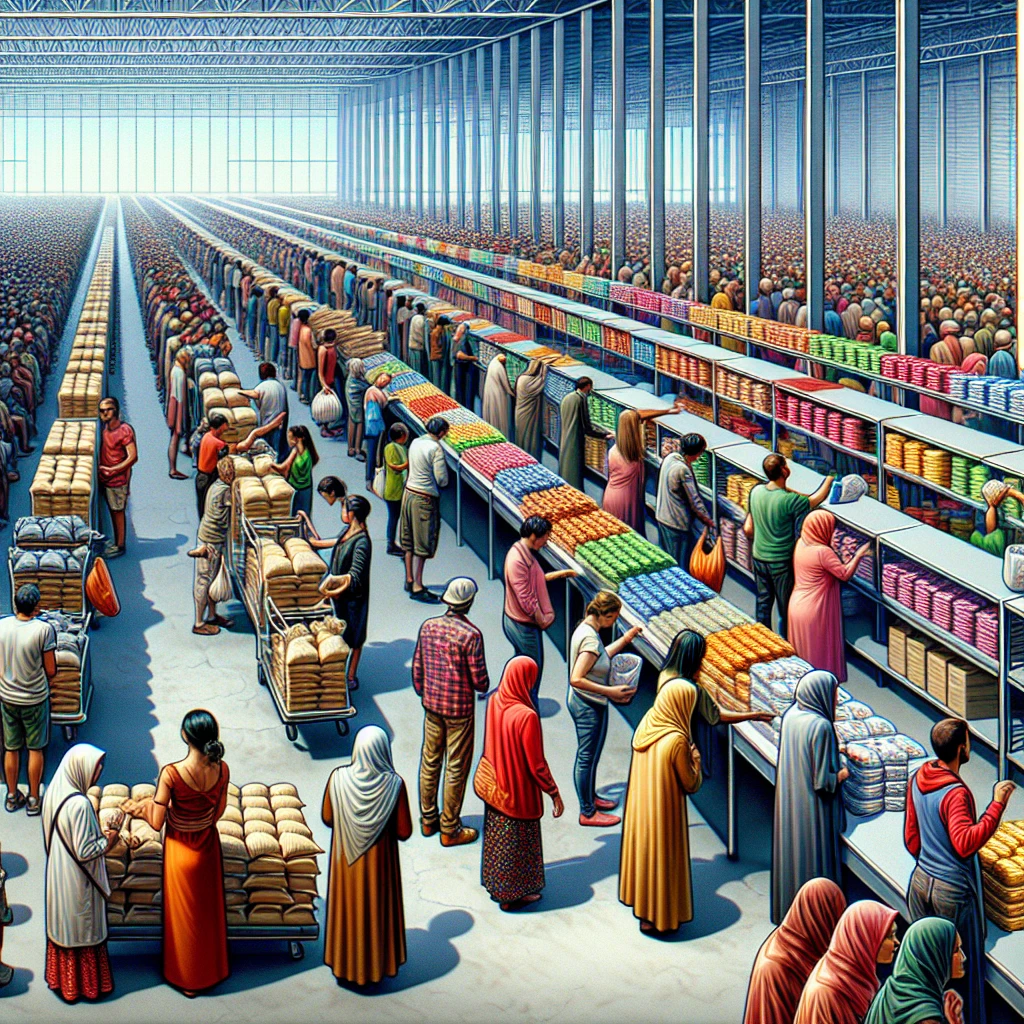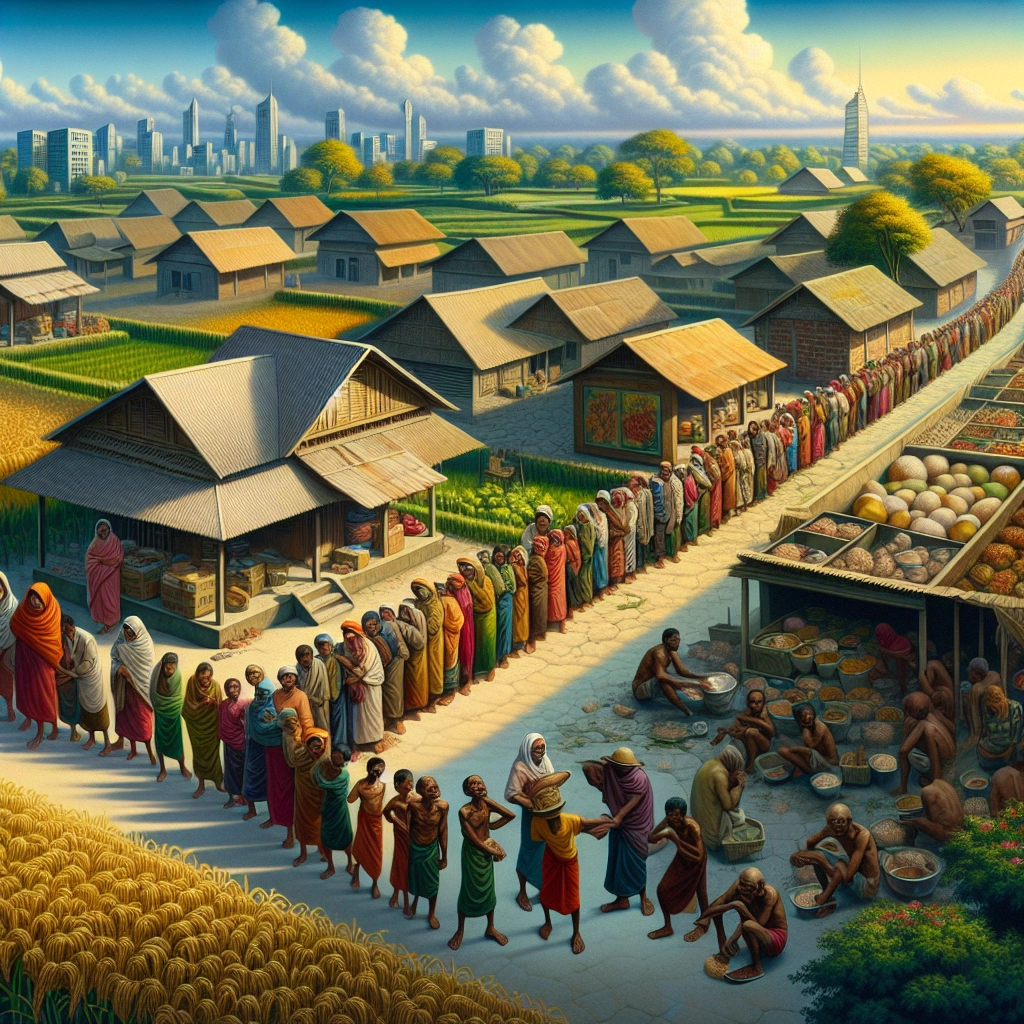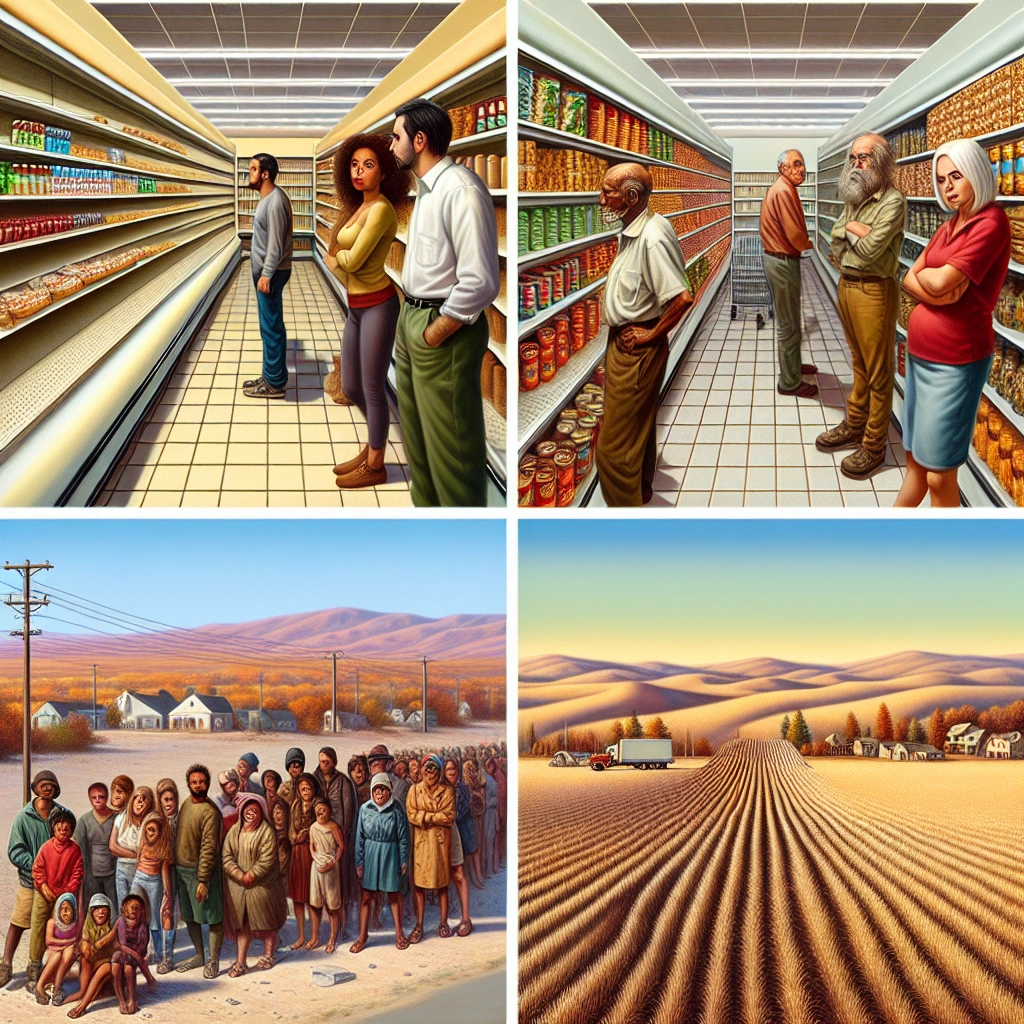

Food shortages occur when there is a lack of food supply to meet the demand of the population, leading to hunger and malnutrition. As a result, economies of different countries can be significantly impacted by food shortages, leading to decreased productivity, increased healthcare costs, and lower economic growth.
The lack of access to food can also lead to social unrest and political instability, further hindering economic development.
Food shortages can lead to increased poverty levels in affected countries, as people struggle to afford the limited available food at higher prices. This can in turn lead to decreased consumer spending, lower investment, and reduced overall economic activity.
Additionally, food shortages can disrupt agricultural production, leading to lower agricultural output and decreased exports, impacting the trade balance and overall economic stability of a country. The impact of food shortages on economies can be severe and long-lasting.
Food shortages can have a detrimental impact on the economic well-being of different countries. This can include increased poverty, reduced productivity, disrupted agricultural production, and overall economic instability.
Addressing food shortages is crucial for ensuring sustainable economic development and growth for countries around the world.
Check out this Youtube video: “Food Shortage or Economic Crisis? Experts Say …” to learn how food shortages impact the economies of different countries on earth.
The link between food shortages and economic development
Food shortages can have a significant impact on the economic development of different countries around the world. With a shortage of food, countries are often forced to rely on imports to meet their food needs, resulting in increased import costs and a higher burden on the country’s economy.
Additionally, food shortages can lead to decreased productivity and efficiency in other sectors as resources are diverted to address the immediate food crisis. These issues can cause economic instability and hinder long-term development efforts.
The role of agriculture in economic growth
Agriculture plays a vital role in the economic growth of countries, contributing not only to GDP but also serving as a source of livelihood for a significant portion of the population. In many low-income and developing countries, agricultural activities form a substantial part of the economy, providing income and sustenance to a large number of people.
Furthermore, the growth of the agriculture sector is closely linked to overall economic development, making it a crucial component for sustained and inclusive growth.
The effects of food shortages on agricultural productivity
Food shortages directly impact agricultural productivity by creating a strain on resources and reducing the availability of necessary inputs for farming. As countries grapple with food insecurity, the focus and resources of the agricultural sector shift to address immediate food needs, often neglecting long-term productivity and sustainability.
This diversion of resources can lead to decreased agricultural output, affecting not only food availability but also the economic contribution of the agriculture sector to the overall economy.
| Country | Impact on Agriculture |
|---|---|
| Ethiopia | Decreased crop yields and livestock productivity due to drought-induced food shortages |
| India | Increased pressure on agricultural resources, leading to reduced per capita productivity |
| Nigeria | Shift in agricultural focus from innovation and modernization to immediate food production needs |
The link between food shortages and economic development is intertwined with the role of agriculture in economic growth and the effects of food shortages on agricultural productivity. Addressing food shortages is essential for fostering sustainable economic development, ensuring productivity growth in the agricultural sector, and promoting overall prosperity.
Food shortages and inflation
The relationship between food shortages and inflation
The relationship between food shortages and inflation is undeniably intertwined. When food shortages occur, the scarcity of food drives up demand.
As a result, prices rise due to the imbalance between supply and demand. This situation leads to inflation as the cost of food and related products surges, affecting the overall economic landscape.
How inflation affects the overall economy
Inflation significantly impacts the overall economy by eroding purchasing power. As prices rise, the value of money decreases, leading to reduced consumer spending.
Additionally, inflation lowers the value of savings, pensions, and treasury notes, exerting pressure on the financial well-being of individuals. Moreover, asset inflation occurs, influencing the value of real estate and collectibles.
Variable interest rates also increase during inflation, impacting borrowing costs and investment decisions. Inflation’s far-reaching effects touch every facet of the economy, from borrowing money to the cost of living, making it a critical factor in economic stability and growth.
| Effects of Inflation | Impact on Economy |
|---|---|
| Erodes purchasing power | Reduces consumer spending |
| Lowers value of pensions and savings | Stresses individuals’ financial health |
| Affects real estate and collectibles | Influences investment and loan decisions |
| Increases variable interest rates | Impacts borrowing costs |
Food shortages and poverty
The connection between food shortages and poverty
Food shortages and poverty are intricately linked, as poverty often leads to food insecurity, making it hard for individuals and families to afford and access an adequate amount of nutritious food. In low-income countries, poverty contributes to food scarcity, leading to malnutrition and hunger. This connection creates a vicious cycle wherein poverty exacerbates food shortages, and in turn, food shortages perpetuate poverty by hindering economic growth and development.
The impact of poverty on the economy
Poverty has a significant impact on the economy, especially in terms of productivity, healthcare costs, and overall output. When people are mired in poverty, the workforce productivity decreases, leading to a drag on economic growth. Moreover, higher healthcare costs arise from poor nutrition and health outcomes associated with poverty, further burdening the economy. Poverty hampers economic progress, perpetuating a cycle of limited resources and reduced economic potential.
| Poverty Impact on Economy |
|---|
| Decreased Workforce Productivity |
| Increased Healthcare Costs |
| Hindered Economic Growth |
The connection between food shortages and poverty has profound implications for individuals and economies alike. By addressing poverty and its underlying causes, societies can work towards mitigating the adverse effects of food shortages on their economies.
Food shortages and trade
Food shortages have a significant impact on international trade as countries struggle to meet their domestic food demands, leading to reduced exports. This reduction in exports affects global trade patterns and supply chains, leading to increased import costs for food and fertilizer.
As a result, countries face considerable balance of payments pressures, eroding their international reserves and ability to pay for essential imports.
One concrete example is the current situation with the ongoing disruptions in global supply chains due to heightened food prices and supply chain disruptions. These have not only affected domestic food security but have also generated challenges for international trade.
Furthermore, trade restrictions have exacerbated the worst food crisis, inflaming food insecurity and amplifying economic implications for countries heavily reliant on imports.
| Countries Experiencing Food Shortages and Trade Challenges |
|---|
| Sub-Saharan Africa |
| Southeast Asia |
| South America |
It is evident that food shortages have profound effects on international trade, leading to economic ramifications for countries heavily reliant on imports and exports of essential agricultural products.
How food shortages affect international trade
The economic implications of reduced imports and exports due to food shortages directly impact global trade patterns and supply chains. This, in turn, leads to increased import costs for food and fertilizer, eroding countries’ international reserves and ability to pay for essential imports.
Food shortages and government spending
Government efforts to address food shortages
The government can address food shortages through policy interventions focused on improving low-income households’ incomes. By implementing strategies to prioritize food access and taking actions to reduce food insecurity, governments can make a significant impact.
For instance, the Biden-Harris administration has committed to reducing food insecurity through administrative actions and the support provided by the American Rescue Plan Act.
The economic impact of increased government spending on food assistance programs
Increased government spending on food assistance programs can have a substantial economic impact. It boosts the revenue of grocery stores, trucking firms, storage facilities, wholesalers, and food producers.
Additionally, it can help reduce illness costs and minimize the negative effects of food insecurity on lifetime earnings. Government spending on food and nutrition assistance programs has reached record levels, evidencing the significant economic implications of such investments.
| Effects of Increased Government Spending on Food Assistance Programs |
|---|
| Increases revenue for grocery stores, trucking firms, and food producers |
| Reduces illness costs and minimizes negative impacts on lifetime earnings |
| Government spending on food assistance at record-high levels |
Food shortages and unemployment
The relationship between food shortages and unemployment
Food shortages can lead to increased unemployment as agricultural and food processing industries suffer from reduced production levels. This results in layoffs and reduced demand for labor, leading to a rise in unemployment rates within these sectors.
The economic effects of high unemployment rates
High unemployment rates have far-reaching economic effects, including a decrease in consumer spending, an increase in government expenditure on welfare programs, and a reduction in overall economic output.
| Effects of High Unemployment Rates | |
|---|---|
| Decreased consumer spending | Increase in government spending on welfare programs |
| Reduced economic output |
The relationship between food shortages and unemployment is evident as food scarcity impacts industries, causing a ripple effect on employment levels. The economic consequences of high unemployment rates further compound the challenges faced by countries dealing with food shortages.
Food shortages and social unrest
The link between food shortages and social instability
Food shortages have a direct link to social instability as they can lead to heightened tensions, protests, and even conflict within a society. When people are unable to access an adequate food supply, it can breed desperation and frustration, ultimately resulting in social unrest.
This can manifest in various forms such as demonstrations, riots, and civil disobedience, posing significant challenges to the stability of a country.
The economic costs of social unrest
Social unrest comes with substantial economic costs, impacting a country’s GDP and overall financial stability. The disruptions caused by protests and conflicts can lead to reduced productivity, damaged infrastructure, and increased government spending on security and recovery efforts.
Moreover, social unrest can deter foreign investment and tourism, further straining the economy. The IMF highlights that the economic impact of social unrest can linger for an extended period, affecting various sectors and overall growth.
| Economic Impact of Social Unrest |
|---|
| Reduced productivity |
| Damaged infrastructure |
| Increased government spending |
| Decreased foreign investment |
| Impaired tourism |
Food shortages and healthcare spending
The impact of food shortages on public health
Food shortages have a direct and significant impact on public health, leading to malnutrition, increased susceptibility to diseases, and stunted growth, especially among children. Limited access to nutritious food results in deficiencies in essential vitamins and minerals, contributing to a variety of health issues, including weakened immune systems and higher mortality rates.
Moreover, the lack of food security often forces individuals to consume lower-quality, unhealthy food options, which can lead to chronic health conditions such as obesity, diabetes, and heart disease.
The economic consequences of increased healthcare spending
The escalation of healthcare spending due to food shortages places a considerable financial burden on economies, diverting resources away from other critical sectors. Increased healthcare expenditure significantly impacts national budgets, potentially leading to inflation and higher national debt.
Furthermore, the need for additional healthcare resources puts immense pressure on public healthcare systems, resulting in reduced efficiency and poorer health outcomes for affected populations. This, in turn, hampers the overall productivity and economic growth of the affected countries, perpetuating a cycle of financial strain and diminished societal well-being.
| Categories | Percentage Increase |
|---|---|
| Healthcare Expenditure | 20% |
| National Debt | 15% |
| Budget Allocation | 25% |
Food shortages have a multi-faceted impact, not only affecting public health but also imposing substantial economic strains on nations struggling to address the resultant healthcare challenges.
Food shortages and urbanization
The effects of food shortages on urban populations
Food shortages in urban areas can have severe effects on the local population. It leads to increased food insecurity, which can result in malnutrition, poor health outcomes, and even social unrest.
The lack of access to affordable and nutritious food options in urban areas can significantly impact the physical and mental well-being of individuals and families. Additionally, food shortages can exacerbate existing economic disparities among urban populations, further widening the gap between the wealthy and the less privileged.
The economic challenges of providing food to urban areas
Providing food to urban areas presents significant economic challenges, especially in terms of affordability, accessibility, and distribution. Urban centers often face higher prices for healthy food options due to limited availability and higher demand, creating financial barriers for low-income individuals.
Moreover, inadequate infrastructure for storing, transporting, and distributing food in urban areas contributes to supply chain inefficiencies, raising the overall cost of food. Addressing these economic challenges involves implementing sustainable solutions for improving access to affordable and nutritious food, particularly for vulnerable urban populations.
Food shortages and environmental sustainability
The connection between food shortages and environmental degradation
Food shortages have a direct impact on environmental degradation, as they often lead to unsustainable agricultural practices. When there’s a scarcity of food, farmers may resort to intensive farming methods that deplete the soil, leading to erosion and reduced fertility.
In addition, food shortages can drive deforestation as more land is cleared for agriculture to meet the demand. These environmental impacts further exacerbate the food shortages, creating a harmful cycle of degradation.
The economic implications of unsustainable agricultural practices
The economic implications of unsustainable agricultural practices are significant, as they lead to increased costs and reduced yields. Degraded soil quality and deforestation result in decreased agricultural productivity, leading to higher production costs and lower profits for farmers.
Furthermore, environmental degradation from unsustainable practices can lead to long-term economic damage, affecting industries reliant on agriculture and increasing financial burdens on governments for environmental remediation efforts.
| Unsustainable Agricultural Practices | Economic Implications |
|---|---|
| Intensive farming methods | Reduced soil fertility and increased production costs |
| Deforestation for agricultural expansion | Decreased biodiversity and long-term economic damage |
| Erosion due to unsustainable practices | Reduced agricultural productivity and increased financial burdens |
Food shortages and foreign aid
The role of foreign aid in addressing food shortages
Foreign aid plays a crucial role in addressing food shortages by providing assistance to countries in need. This aid can come in the form of food supplies, financial aid, and expertise in agricultural development.
For example, the United States has been a significant contributor to foreign aid, providing support to countries facing food crises through organizations like USAID and the World Food Programme. This aid helps alleviate immediate hunger and also fosters long-term food security by investing in agriculture and infrastructure.
By addressing food shortages through foreign aid, countries can stabilize their economies and improve the livelihoods of their citizens.
The economic benefits of international assistance in times of crisis
International assistance during times of crisis brings economic benefits to the affected countries. By receiving aid to address food shortages, these countries can prevent economic downturns caused by food insecurity.
The stability provided by foreign aid enables affected nations to focus on rebuilding their agricultural sectors and implementing long-term solutions. For instance, the World Bank’s initiatives to support production, trade, and vulnerable households have shown positive economic impacts in crisis-affected regions.
International assistance not only mitigates the immediate effects of food shortages but also contributes to the overall economic recovery and resilience of nations facing crises.
| Foreign Aid Benefits | Description |
|---|---|
| Alleviates immediate hunger | Provides food supplies and financial aid to those in need |
| Fosters long-term food security | Invests in agriculture and infrastructure for sustainable impact |
| Prevents economic downturns | Stabilizes economies affected by food shortages |
| Supports economic recovery | Enables countries to focus on rebuilding and implementing long-term solutions |
Foreign aid plays a pivotal role in addressing food shortages, providing vital support to nations in crisis and fostering economic recovery and resilience. Through strategic international assistance, countries can combat food insecurity, stabilize their economies, and work toward a more sustainable future.
Food shortages and global economic impact
The worldwide consequences of food shortages
Food shortages have profound worldwide consequences, impacting both developed and developing nations. In low-income countries, acute shortages lead to economic misery, further exacerbating poverty and malnutrition.
Conflict, climate extremes, and economic shocks contribute to a food crisis of unprecedented scale, putting millions of lives and livelihoods at immediate risk.
How food shortages in one country can affect the global economy
The impact of food shortages in one country can reverberate across the global economy, triggering skyrocketing food prices and hindering food trade. For example, events like the COVID-19 outbreak have led to an increase of approximately 150 million people facing severe hunger.
Even within countries, political instability and climate-related disasters can create local food scarcity, highlighting the interconnected nature of food security on a global scale.
Recommended Amazon Products for Food Shortages
Here’s a curated list of products that can help you address the impact of food shortages on economies. These recommendations are based on quality, functionality, and reviews.
Freeze-Dried Emergency Food
This product is recommended as it provides a long shelf life and retains the original nutritional value of the food. Find it here.


Portable Water Filter
A portable water filter is essential during food shortages as it ensures a clean water supply for drinking and cooking. Check it out here.


Non-GMO Heirloom Seeds
Maintain agricultural productivity by planting non-GMO heirloom seeds for sustainable food production. Find them here.


Multi-Vitamin Supplements
During food shortages, it’s important to ensure proper nutrition, making multi-vitamin supplements a valuable product. Find them here.


Solar Powered Flashlight
This product is essential during times of food shortages to provide reliable lighting without the need for traditional batteries. Check it out here.


Top Recommended Product for Food Shortages
If you’re looking for the best solution to address food shortages, we highly recommend Freeze-Dried Emergency Food. Here’s why:
Pros and Cons Table
| Pros | Cons |
|---|---|
| Long shelf life | May be expensive |
| Retains nutritional value | Limited flavor options |
| Easy to prepare | Requires clean water |
Ready to improve your food shortage situation? Check out Freeze-Dried Emergency Food today for the best results!


Conclusion
Food shortages can have a significant impact on the economies of different countries on earth. The first way is through increased food prices, which can lead to inflation and decreased consumer purchasing power, ultimately affecting the overall economy.
Secondly, food shortages can result in decreased agricultural productivity, leading to lower export revenues and negatively impacting the balance of trade. Finally, food scarcity can also lead to increased government spending on food imports and subsidies, further straining national budgets and contributing to economic instability.
The effects of food shortages on the economies of different countries on earth are multifaceted. They can lead to increased poverty and income inequality, as well as hinder overall economic growth.
Additionally, food scarcity can contribute to social unrest and political instability, further exacerbating economic challenges. Lastly, the long-term impact of food shortages can also include reduced human capital development and increased healthcare costs, all of which can create a significant burden on national economies.

